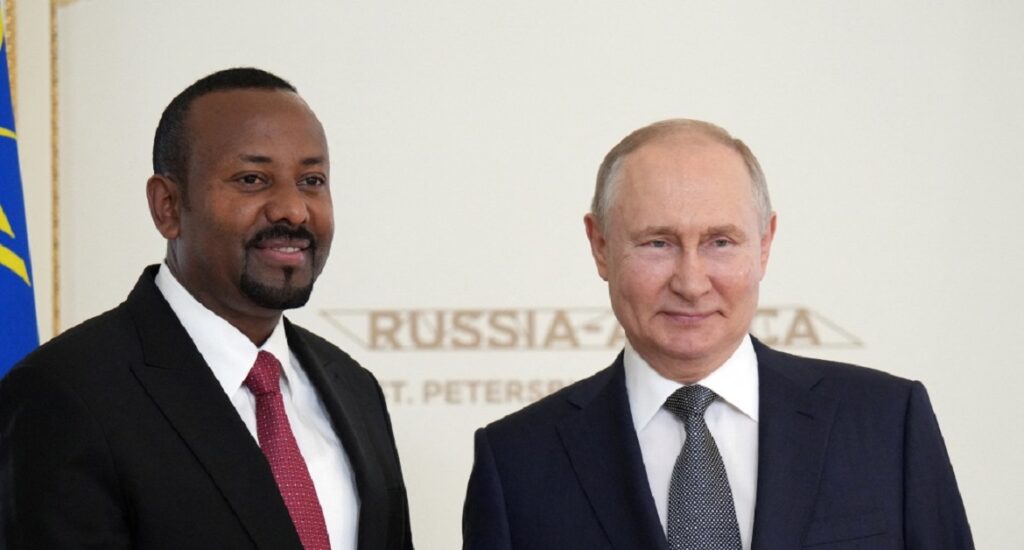World Geostrategic Insights interview with Tatiana Pokrovskaia on the progress in Russia-Africa economic cooperation.

Tatiana Pokrovskaia is an international business development professional with more than 20 years of experience in the markets of Africa, CIS, Asia and the Middle East, repeatedly bringing Russian companies into international markets. She is based in St. Petersburg, Russia.
Q1 – African governments are increasingly welcoming economic, diplomatic and security ties with Russia, whose influence has been gaining ground across Africa in recent years. In 2023, Russian exports of petroleum products to Africa almost doubled, and grain exports grew significantly. In essence, African countries increased imports from Russia by 100 percent over the previous year and a number of African countries also strengthened their trade deals with Russia, although in terms of value of goods, African countries still import five times more from Russia than they export to it. Russia mainly sells grain, fertilizer, hydrocarbons and their derivatives, while buying agricultural products and minerals. On what basis and principles does Russia build its economic presence in Africa?
A2 – This is a very capacious question that affects more than 100 years of relations between Russia (former USSR) and African countries. One could mention the most large-scale Soviet projects implemented by the USSR in African countries, especially in Angola, Guinea, the Republic of Congo, Mali, Nigeria and others. For example, a joint Russian-Angolan-Brazilian project – the construction of the Kapanda hydroelectric power station on the Kwanza River (Angola), one of the 3 largest hydroelectric power stations in Africa – a hydroelectric power station in Angola and the grandiose Aswan Dam in Egypt, as well as a bauxite mining complex in Guinea, a mining plant in Congo and a cement plant in Mali, a metallurgical plant in Nigeria and others. More than 600 enterprises were built by Soviet specialists. Soviet doctors, engineers and other specialists have always worked in Africa.
Currently, Russian specialists are building a nuclear power plant in Egypt, and negotiations are underway on the construction of a nuclear power plant in Ethiopia.
Moreover, projects have always been and remain aimed specifically at the development of African countries. The main goal of Russia in Africa, outlined by the strategy of the President of Russia, is promoting the transformation of Africa into a “distinctive and influential center of world development”, recognition of the civilizational diversity of the modern world, adherence to the principle of non-interference in the internal affairs of states and respect for their sovereignty, as well as non-imposition of any models of political structure or economic development on them. (From the Decree of the President of the Russian Federation dated November 30, 2016 No. 640 “On approval of the Foreign Policy Concept of the Russian Federation”). Russia focuses on fundamental principles that are important for African countries. An important point in the global trend of today is the growth of inequality in the world. It should also be taken into account that Russia does not have a colonial past, which contributes to greater trust on the part of African countries..
Q2 – Are the Ukrainian conflict and Western economic sanctions against the Russian Federation hampering the Russian-African ties?
A2 – Really, it is not so..
Russia, as a permanent member of the UN Security Council, makes a significant contribution to the development of strategic direction and practical actions in matters of strengthening peace and stability in Africa, preventing local conflicts, and determining the status and mandates of various peacekeeping operations. African countries were provided with broad trade preferences. Main African imported goods are subject to preferential customs tariffs.
The Russian Federation is helping to ease the debt burden of states in the region. To date, the IMF-World Bank Heavily Indebted Poor Countries Initiative has written off most of Africa’s debt—more than $20 billion. The Debt for Development Program is being implemented, which is the subject of an intergovernmental agreement with Madagascar, Mozambique and Tanzania. As part of the implementation of this agreement with Mozambique, in cooperation with the World Food Program (WFP), a pilot project is being implemented to develop a school feeding system, where debt conversion takes place over 5 years, the amount is $40 million. And many other projects.
Q3 – How can Russia carve out an important economic space in Africa in the face of a giant like China, which is gaining more and more economic relevance on this continent?
A3 – Russia and China support a policy of non-interference in the internal affairs of other countries and contribute to the development of African countries, where China is by “money” and Russia by “muscle” (as mentioned by politician K. Malanga (DR Congo).This is a difference in approach.
Speaking of ideological similarities, Moscow and Beijing act as partners in African countries rather than competitors in their traditional sense.
An obvious example is where private companies from China and Russia, with the support of governments, began mining diamonds in the Central African Republic. There are many areas of cooperation here, including the construction of infrastructure within the framework of the “One Belt – One Road” initiative, etc.
Q4 – Russia develops relations with African countries both bilaterally and on a continental level (Russia-Africa summits). You visited Ethiopia recently, so let’s focus on this country. Russia has played a leading role in accepting Ethiopia as a full member of BRICS, despite many obstacles. Ethiopia has yet to overcome the consequences of a devastating civil war that severely damaged its economy and led to a humanitarian catastrophe, and this country is now looking to Russia for an economic revival. The two countries have agreed to strengthen trade and cooperate in agriculture and manufacturing, and have signed Memoranda of Understanding to strengthen cooperation especially in the health and education sectors. How Russian-Ethiopian cooperation is shaping up. What are its prospects?
In 2023, Russia and Ethiopia celebrated the 125th anniversary of diplomatic relations between the two countries. Friendly relations between our countries go back many centuries, which is also facilitated by a common faith – Christianity. There was a period of reduction in intercountry cooperation, but at the moment it is at a very high level. And you correctly noted Russia’s leading role in Ethiopia’s admission to BRICS. Ethiopia supports the Russian Federation on the UN agenda, opposing US sanctions.
Areas of cooperation embrace healthcare, agriculture, mining, geological prospecting, IT, negotiations are underway on the construction of nuclear power plants by the Russian state corporation Rosatom and others. Russia offers innovations in various fields to develop the Ethiopian economy.
The positions of both countries on issues of international cooperation largely coincide – from the need to develop equal partnerships and respect for human rights to the ideas of multipolarity in the modern world order.
My visit to Ethiopia was within the framework of the Russian-Ethiopian Business Forum in December 2023. We noted a great interest in Russian technologies, and a high loyalty of the local population: we constantly heard “Russia is in our hearts.” So, there are very great prospects for relations between our countries.
Tatiana Pokrovskaia – International business development professional.







